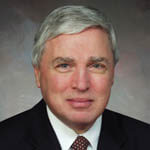
San Antonio (Feb. 20, 2004) – There could be no more fitting keynote speaker, at the dedication of a new cancer research institute for San Antonio, than a three-time cancer survivor. Andrew von Eschenbach, M.D., director of the National Cancer Institute, will bring his unique perspective as a cancer physician and survivor to the dedication of The University of Texas Health Science Center at San Antonio’s Children’s Cancer Research Institute (CCRI). The dedication begins at 11 a.m. Tuesday, Feb. 24, at the Health Science Center’s North Campus, 8403 Floyd Curl Drive in the South Texas Medical Center. The public is invited to attend.
Francisco G. Cigarroa, M.D., president of the Health Science Center, is a fellow cancer survivor. He will welcome Dr. von Eschenbach and other speakers including businessman and community leader Red McCombs, state Sen. Judith Zaffirini, UT System Chancellor Mark Yudof, Bexar County Judge Nelson Wolff and CCRI Director Sharon Murphy, M.D. Cyndi Taylor Krier, vice chairman of the UT System Board of Regents, is an invited guest, and James Huffines, chair of the board’s Facilities Planning and Construction Committee, will officially accept the building on behalf of the Board of Regents.
The CCRI is supported by a $200 million endowment, the largest single endowment for cancer in the country. McCombs was instrumental in the early moves to place the endowment in San Antonio and will give personal insights into that process. The expected audience of 400-plus will include many other invited elected officials and community leaders.
Dr. von Eschenbach was named director of the National Cancer Institute in January 2002 and spent 25 years at the UT M.D. Anderson Cancer Center as a leading urologic surgeon with major research interest in prostate cancer. In a recent article he wrote for USA TODAY, Dr. von Eschenbach pointed out that “devoting your professional life to fighting cancer does not ensure that you will avoid having to battle it personally – as I well know.” He has endured diagnoses of and treatment for melanoma, prostate cancer and basal cell carcinoma.
Perhaps no one is more interested in new research centers such as the one the Health Science Center is dedicating. The Children’s Cancer Research Institute is located in a sparkling $50 million building that will house laboratories for 18-20 of America’s top cancer scientists and their research groups. The CCRI will bolster the Health Science Center’s ranking in the top 15 percent of the public and private research universities in America.
The CCRI will be a top-flight research center where today’s cancer research will become tomorrow’s breakthroughs. “While my personal battles with cancer have been successful, I am also intimately familiar with many lost battles,” Dr. von Eschenbach wrote. “But as my own experience shows, cancer is no longer an automatic death sentence. We have made tremendous progress against this disease.”
He recently announced that the National Cancer Institute has a new goal “to eliminate suffering and death due to cancer by 2015.” Centers such as the Children’s Cancer Research Institute will figure prominently in meeting that goal.




